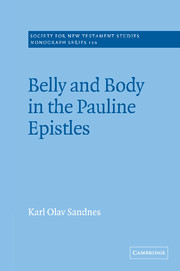Book contents
- Frontmatter
- Contents
- Preface
- Abbreviations
- Part 1 Prolegomena
- Part 2 The Graeco-Roman belly
- Part 3 The appropriated belly
- 6 The belly-topos in Jewish-Hellenistic sources
- 7 The belly in Philo's writings
- Part 4 Belly-worship and body according to Paul
- Part 5 The earliest expositors of Paul
- Part 6 Conclusions
- Bibliography
- Index of modern authors
- Index of Graeco-Roman sources
- Index of Old Testament, Apocrypha, Pseudepigrapha and other Jewish writings
- Index of New Testament and early Christian writings
6 - The belly-topos in Jewish-Hellenistic sources
Published online by Cambridge University Press: 22 September 2009
- Frontmatter
- Contents
- Preface
- Abbreviations
- Part 1 Prolegomena
- Part 2 The Graeco-Roman belly
- Part 3 The appropriated belly
- 6 The belly-topos in Jewish-Hellenistic sources
- 7 The belly in Philo's writings
- Part 4 Belly-worship and body according to Paul
- Part 5 The earliest expositors of Paul
- Part 6 Conclusions
- Bibliography
- Index of modern authors
- Index of Graeco-Roman sources
- Index of Old Testament, Apocrypha, Pseudepigrapha and other Jewish writings
- Index of New Testament and early Christian writings
Summary
Sir. 23:6
Chap. 23 provides a lengthy prayer of the wise man. He prays not to be overcome by gluttony (κοιλίας ὄρεξις) and lust (συνουσιασμός). A more literal rendering of the LXX text would be the longing or yearning of the belly. Thus the belly is seen as a seat of the desires; here obviously in an unfavourable sense. The noun ὄρεξις is often used of sexual passion in particular (Ant. 7:169; Rom. 1:27). The verb καταλαμΒάνεσθαι has here a hostile reference; the stomach is spoken of as an enemy from which the pious prays to be protected. Alongside the belly, the prayer mentions συνουσιασμός, which in this context refers to the temptation to illegitimate sexual intercourse, an issue which is elaborated from v. 16 on. The righteous considers himself under threat from two great inner powers, that of the belly (gluttony) and sex. The two are mentioned together, and represent the desires from which he asks God to protect him.
T. Rub. 2:1–3:8
In Testaments of the Twelve Patriarchs, T. Rub. 2:1–3:8 speaks of human beings as created with seven spirits; i.e. the faculties of breathing, seeing, hearing, speaking, tasting, procreating, and, first of all, life itself. Beliar, the chief of the demons, takes these faculties as opportunities to deceive; i.e. his seven spirits of deceit (τὸ πνεεμα τῆς πλάνης). In 3:2, which is probably part of an interpolation, Beliar is said to introduce the spirits of deceit into the natural faculties.
- Type
- Chapter
- Information
- Belly and Body in the Pauline Epistles , pp. 97 - 107Publisher: Cambridge University PressPrint publication year: 2002



